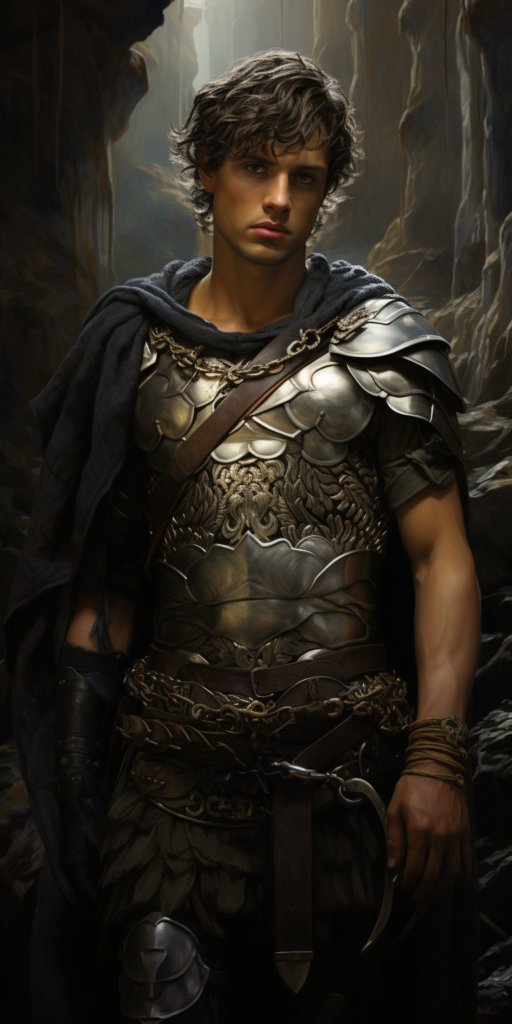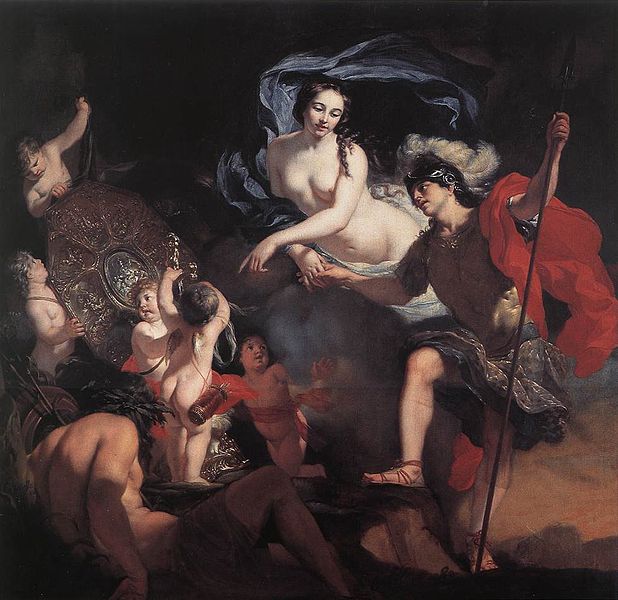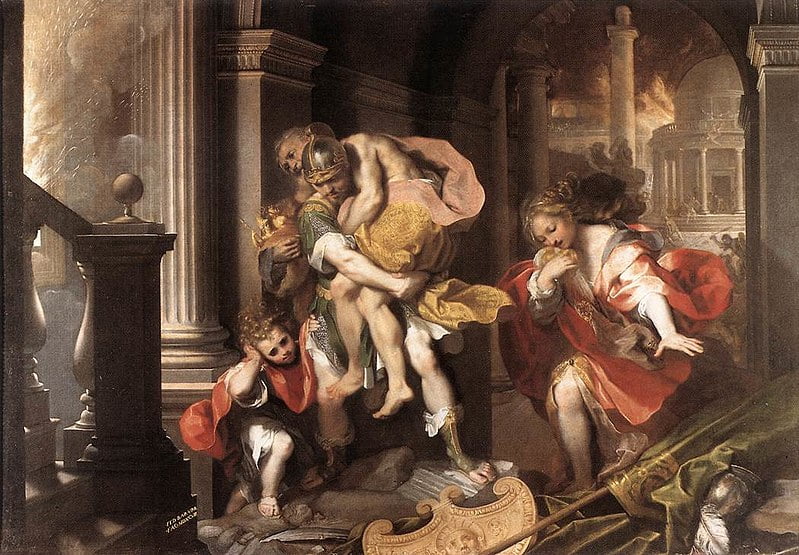Aeneas, the Fated Hero: Guided by the Gods on a Journey of Destiny
“From Exiled Prince to Heroic Warrior: The Epic Journey of Aeneas!”

- Alias: None
- Gender: Male
- Race: Human
- Occupation: Warrior, Leader
- Religion: Devout follower of the gods, particularly Aphrodite and Apollo
- Allies: Trojan warriors, the gods
- Enemies: Greeks, enemies of Troy
- Abode/Base of Operations: Troy, various locations during his wanderings
- Nationality: Trojan
- Languages: Trojan, Greek
- Alignment: Lawful Good
- Affiliation(s): Trojans, Trojan royal family
- Significant Others: Creusa (wife), Dido (former lover), Lavinia (wife)
In the war-ravaged world of ancient Troy, a noble and valiant warrior emerges—Aeneas. He is the son of the goddess Venus and the mortal Anchises, a union that sets him apart with divine lineage. Born into a city beset by conflict, Aeneas carries the weight of his people’s hopes and dreams upon his shoulders. His journey is one of great significance, driven by a profound sense of duty and a burning desire to fulfill his destiny.
Aeneas is a man of unwavering resolve, embodying the virtues of honor, bravery, and loyalty. He fights with unmatched courage on the battlefield, leading his fellow Trojans with a commanding presence. Despite the turmoil and chaos surrounding him, he remains steadfast in his principles, guided by a strong moral compass.
Driven by a higher purpose, Aeneas sets forth on a perilous journey after the fall of Troy. His mission is clear—to seek a new home for his people, to establish a prosperous and peaceful future. He carries with him the weight of his ancestry and the divine will of the gods, who have tasked him with a grand destiny.
Throughout his odyssey, Aeneas encounters a myriad of challenges and obstacles. He faces treacherous seas, hostile lands, and confrontations with both mortals and gods. Yet, he persists, fueled by an unwavering determination to forge a new path for his people.
Aeneas’s unwavering devotion to his family and his people is a driving force behind his actions. He seeks to protect and provide for his loved ones, ensuring their safety and prosperity. His journey is not solely for personal gain but for the betterment of all who follow him.
As Aeneas navigates the tumultuous world of ancient mythology, he remains steadfast in his pursuit of a promised land—a place where his people can thrive and establish a new Troy. His unwavering commitment to his mission and his unwavering faith in the gods make him a figure of legendary stature, an icon of determination, and a symbol of hope in a time of chaos.
Aeneas 5e
Aeneas 3.5
Aeneas

Medium humanoid (human), lawful good
Armor Class 18 (breastplate, shield) Hit Points 180 (20d10 + 60) Speed 30 ft.
| STR | DEX | CON | INT | WIS | CHA |
|---|---|---|---|---|---|
| 18 (+4) | 14 (+2) | 16 (+3) | 12 (+1) | 14 (+2) | 16 (+3) |
Saving Throws Str +8, Con +7 Skills Athletics +8, Perception +6 Senses passive Perception 16 Languages Common, Trojan
Challenge 12 (8,400 XP)
Actions Multiattack. Aeneas makes two melee attacks.
+2 Trojan Sword. Melee Weapon Attack: +9 to hit, reach 5 ft., one target. Hit: 11 (1d8 + 7) slashing damage.
Shield Bash. Melee Weapon Attack: +9 to hit, reach 5 ft., one target. Hit: 8 (1d6 + 4) bludgeoning damage. If the target is a creature, it must succeed on a DC 15 Strength saving throw or be knocked prone.
Legendary Actions Aeneas can take 3 legendary actions, choosing from the options below. Only one legendary action option can be used at a time and only at the end of another creature’s turn. Aeneas regains spent legendary actions at the start of his turn.
Unyielding Defense. Aeneas gains 5 temporary hit points.
Heroic Strike. Aeneas makes one melee attack with his Trojan Sword.
Inspiring Presence (Costs 2 Actions). Aeneas grants allies within 30 feet advantage on their next attack roll or saving throw.
Equipment
- +2 Trojan Sword (longsword)
- Shield of Aeneas (magical shield)
- Breastplate
- Trojan War Helm
- Cloak of Troy
- Boots of the Wanderer
- Signet Ring of the Trojan Prince
- Amulet of Aphrodite’s Blessing
Legendary Magic Item
- Shield of Aeneas: This magical shield grants Aeneas advantage on saving throws against spells and magical effects, and once per day, he can use a reaction to impose disadvantage on an attack roll against him or an adjacent ally.
Description Aeneas, the noble Trojan prince, stands tall with a regal presence. He is adorned in a finely crafted breastplate, bearing the emblems of Troy. Aeneas wields a formidable +2 Trojan Sword, a weapon passed down through his lineage. His trusty Shield of Aeneas, a symbol of divine favor, offers unparalleled protection. Aeneas embodies the spirit of a leader and a warrior, his piercing eyes reflecting both determination and wisdom. Currently, he commands a loyal band of Trojan survivors, guiding them through the aftermath of the fall of Troy. Aeneas’s surroundings vary, but his unwavering resolve to secure a new homeland for his people drives his actions and decisions.
CR Level Aeneas is a formidable warrior and a prominent figure in the Trojan saga. With his legendary equipment and strategic skills, he poses a significant challenge to any adventurers. Aeneas is best suited for encounters with a challenge rating of 12, requiring resourcefulness and teamwork to overcome.
Trojan War: Roleplaying in the Age of Homeric Adventure
A Mythic Vistas Sourcebook for the d20 System
Written by Aaron Rosenberg
Aeneas is a large, well-built man with blond hair and extremely handsome features. He is the son of Aphrodite and the Trojan prince Anchises,
and the leader of the Dardanian forces. Aeneas is also second-in-command of the Trojan forces, and considered their greatest military leader after Hector. Aeneas is a warrior, and like Hector, he favors direct speech and action. He is less blunt than Hector, however, and uses his words and his looks to good effect. Aeneas’ closest ally is his mother Aphrodite, who constantly watches over him.
| Aeneas | |
| Male major divine off spring Charioteer 14/Orator 2; | |
| Medium humanoid; | |
| Hit Dice | 14d10+42 plus 2d6+6; hp 132; |
| Initiative | +4 |
| Speed | Spd 35 ft.; |
| Armor Class | AC 31, touch 14, flat-footed 27; |
| Base Attack/Grapple | +15 /+18 |
| Attack | +19 melee (1d6+4/19-20, +1 short sword of speed) or +19 ranged (1d8+4, throwing spear); |
| Full Attack | +19/+19/+14/+9 melee (1d6+4/19-20, +1 short sword of speed) or +19 ranged (1d8+4, throwing spear); |
| Space/Reach | 5 ft./5 ft. |
| Special Attacks | sideswipe, wheeled attack; |
| Special Qualities | beyond limits, captive audience, capture, chariot expertise, charmer, glib, gauge skill, improved voice command, skilled horseman, skillful maneuvering, trained steeds, voice command, +4 bonus to saves against divine spells; |
| Saves | Fort +7, Ref +13, Will +9; |
| Abilities | Strength 16, Dexterity 18, Constitution 16, Intelligence 12, Wisdom 14, Charisma 18. |
| Skills | Bluff +10 (+12 against audiences, +16 against commoners), Diplomacy +8 (+10 against audiences, +14 against commoners), Drive +11, Gather Information +6, Handle Animal+11, Intimidate +14 (+16 against audiences, +20 against commoners), Knowledge (tactics) +8, Listen +4, Perform (oratory) +8 (+10 against audiences, +14 against commoners), Ride+6, Sense Motive +6; |
| Feats | Chariot Attack*B, Distinctive*, Drive-By Attack*B, Favored*, Noble*, Pampered*, Persuasive, Stunning*. |
| Environment | – |
| Organization | – |
| Challenge Rating | 18 |
| Treasure | – |
| Alignment | Lawful Good |
Possessions: +1 burnished layered bronze panoply, +1 layered round bronze shield, +1 short sword of speed, throwing spears, metal chariot drawn by the Horses of Tros, heavy warhorses granted by Zeus to King Tros in payment for his abduction of Ganymede. They are faster than any mortal horse (+10 land speed), and have damage reduction 10/magic.
Currently in the World

Aeneas stands tall and proud, his muscular frame displaying the strength and endurance of a seasoned warrior. He has a regal bearing, exuding an air of authority and leadership. His eyes, a deep and penetrating brown, hold a mix of determination and wisdom, a testament to his experiences.
Currently, Aeneas finds himself in the midst of a battlefield. His armor, adorned with intricate Trojan designs, gleams under the sun as it reflects the hardships of his journey. He wields a magnificent golden sword, a symbol of his lineage and divine favor. His shield, emblazoned with the emblem of Troy, provides protection against the onslaught of enemy attacks.
Surrounded by his loyal Trojan warriors, Aeneas commands the battlefield with strategic precision. His voice resonates with confidence and courage, inspiring his comrades to fight alongside him. His movements are swift and calculated, his every action a testament to his years of training and experience.
Despite the chaos of battle, Aeneas maintains a focused and composed demeanor. His eyes are sharp and observant, analyzing the battlefield and making split-second decisions. He remains steadfast, driven by his duty to protect his people and fulfill his destiny.
A sense of determination and resilience radiates from Aeneas. He is fueled by a deep desire to forge a new home for his people, to ensure the survival of Troy and its legacy. Though the weight of his responsibilities may bear heavily upon him, he carries himself with unwavering resolve, guided by the divine prophecies and his unyielding belief in his mission.
Aeneas: Hero of Troy and Founder of Roman Destiny
Aeneas is a central figure in both Greek and Roman mythology, renowned as a noble Trojan prince, a survivor of Troy’s fall, and the mythical progenitor of Rome. He was the son of the mortal Anchises, a cousin of King Priam, and the goddess Aphrodite (Venus, in Roman mythology). This divine lineage marked Aeneas from birth as a figure of immense importance, destined to shape the future of civilizations.
Aeneas in the Trojan War
In Homer’s Iliad, Aeneas appears as a brave warrior, fighting alongside the Trojans. He commands the Dardanians, a Trojan ally, and serves as one of Hector’s key lieutenants. Throughout the war, he is repeatedly protected by the gods. Aphrodite rescues him from Diomedes, and even Poseidon—normally hostile to Trojans—saves him from Achilles, noting that Aeneas is fated to survive and found a great people.
The Flight from Troy
When the Greeks finally sack Troy, Aeneas makes a fateful decision: instead of dying in defense of the ruined city, he chooses to preserve its legacy. With his aged father Anchises on his shoulders, his young son Ascanius by his side, and the sacred Lares and Penates (household gods) in hand, he leads a group of survivors into exile. This moment of pietas (dutiful devotion) becomes a cornerstone of Roman values.
The Voyage and Dido’s Tragedy
Aeneas’ journey across the Mediterranean is long and perilous, guided by the will of the gods. After many trials, he lands in Carthage, where he is welcomed by Queen Dido. The two fall in love, and Dido proposes that Aeneas stay and rule jointly. However, Jupiter sends Mercury to remind Aeneas of his destiny: to found a new homeland in Italy. Aeneas departs secretly, and a heartbroken Dido curses his descendants before taking her own life—a mythical origin for the historic rivalry between Rome and Carthage.
The Prophecy and War in Latium
Aeneas finally reaches Latium in Italy, where he is received by King Latinus. A prophecy declares that Lavinia, Latinus’ daughter, must marry a foreigner—Aeneas—not Turnus, her original suitor and a powerful local warlord. Latinus honors the prophecy, sparking a war. The conflict pits Aeneas and his new allies—including King Evander of Pallanteum and the Etruscans—against Turnus and the fiery tyrant Mezentius.
Throughout the war, Aeneas remains a model of Roman virtue: loyal, brave, and guided by destiny rather than personal desire. His mother Venus secures him a set of divine weapons crafted by Vulcan (Hephaestus), symbolizing divine favor.
Triumph and Apotheosis
After many battles and heroic deaths—such as those of the warrior-princess Camilla and young Pallas—Aeneas finally defeats Turnus in single combat. Although Turnus begs for mercy, Aeneas sees that he is wearing the belt of Pallas, whom Turnus had killed. Enraged, Aeneas slays him, sealing his fate and the foundation of Roman greatness.
Aeneas then establishes the city of Lavinium, named after his wife, and begins the line of Alban kings. Eventually, his son Ascanius (also called Iulus) founds Alba Longa, the royal seat of his descendants. Romulus and Remus, and thus Rome itself, would later arise from this lineage. The Julian family of Rome—especially Julius Caesar and Augustus—traced their divine ancestry to Aeneas and Venus, reinforcing their claim to rule.
After his death, Venus pleads with Jupiter to grant Aeneas immortality. The river god Numicius purifies him of mortality, and he is transformed into a god, Indiges, worshipped as a divine ancestor of the Roman people.
Legacy
Aeneas is the embodiment of pietas—devotion to family, the gods, and destiny. Unlike Homeric heroes driven by personal glory, Aeneas sacrifices his own desires for the greater good. In The Aeneid, Virgil crafts him not merely as a hero, but as a symbol of Rome’s divine origin, cultural identity, and imperial destiny.
His story bridges the Greek and Roman worlds, transforming the tragedy of Troy into the triumph of Rome.

 Buy me a coffee
Buy me a coffee